
Hinduism

A Brief History of Hinduism:
The birthplace of Hinduism is Indus River Valley which runs through northwest India into Pakistan. The Indus Valley civilization, or "Harappan civilization" originated sometime around 4,500-5,000 B.C.E. and reached its zenith between 2300 to 2000 BC. The two major known cities of the Indus Valley civilization were Harappa and Mohenjodaro. Harrappa was first excavated in 1921. These cities indicate a centralized state with extensive town planning, common construction techniques, regular weights and measures, as well as trade, farming and domesticated animals.
The word "Hindu" originates from the Sanskrit word for river, sindhu. The Indus River running through northwest India into Pakistan received its name from the Sanskrit term sindhu. The Persians designated the land around the Indus River as Hindu, a mispronunciation of the Sanskrit sindhu. In 1921 archaeologists uncovered evidence of an ancient civilization along the Indus River, which today is dated to around 3300BC and thought to represent one of the largest centers of human habitation in the ancient world. The Indus Valley Civilization extend quite far from the banks of the Indus River including parts of contemporary Pakistan, Afghanistan, Iran, and India. Scholars believe that the Indus Valley Civilization had begun to decline by 1800BC, possibly due to climate change. Because of its location between the Indian Subcontinent and the Iranian plateau, the area has seen many military invasions including Alexander the Great, the Persian empire, and the Kushan empire. In 712AD, the Muslims invaded the Indus Valley. To distinguish themselves, they called all non-Muslims Hindus; the name of the land became, by default, the name of the people and their religion (Schoeps, 1966, p. 148).
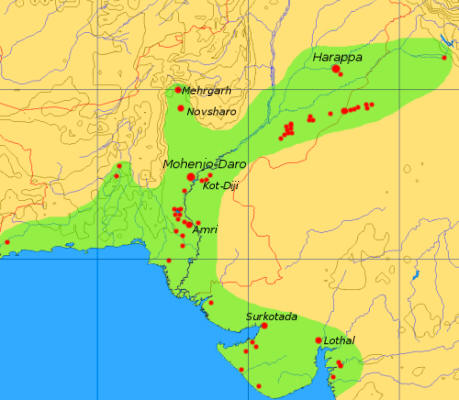 |
| Map depicting the Indus Valley Civilization as well as its major
cities cirica 3000 BC.
From Wikipedia: |
God/Gods:
Hindus have diverse beliefs about gods. Hindus hold that there is one supreme
God--Brahman. Brahman is the impersonal ultimate reality or world soul.
All beings are part of Brahman and Brahman is likewise part of all things.
Humans cannot describe or comprehend Brahman. However, there are numerous gods and goddesses
in Hinduism. These gods represent aspects of the One Supreme God. An
important trio of these appearances of Brahman, sometimes called the Hindu trinity of Brahman,
consists of the creator (Brahma), the preserver (Vishnu), and destroyer (Shiva) of the universe.
Though Brahma is the creator, he is the minor god of the three and is said to
have gown in a lotus out of the navel of the sleeping Vishnu. He has four
heads, but once had one, grew four more, and then lost one. Vishnu is the god of duration, preservation,
and of natural cycles. Vishnu's completeness and greatness exceeds the
other three gods because he contains every possible contradiction and in consequence.
Hindus often portray Vishnu dressed lavishly and having four arms. Vishnu
usually carries his symbols in his hands and often has a U shaped symbol on his
forehead. Shiva is the aspect of perpetual change, destruction, and
transition. Shiva, also known as the "good One," is more complex than Vishnu.
Hindus often portray Shiva as sitting upon a tiger or panther skin, having three white horizontal stripes upon his
forehead, and a third vertical eye. Shiva's vertical eye gives light to the
world.
Another popular Hindu God is Ganesha, who is easily identified by his elephant
head. Hindus characterize Ganesha as the Remover of Obstacles, the Lord of
Beginnings, and/or the Lord of Obstacles. Ganesha is also deva (god) of
intellect and wisdom and the patron of arts and sciences.
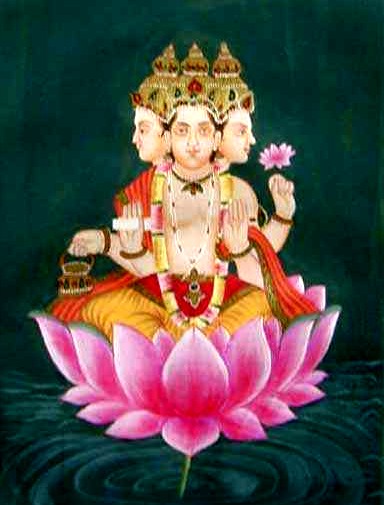 |
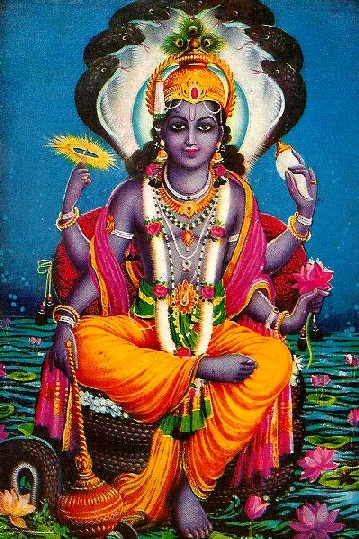 |
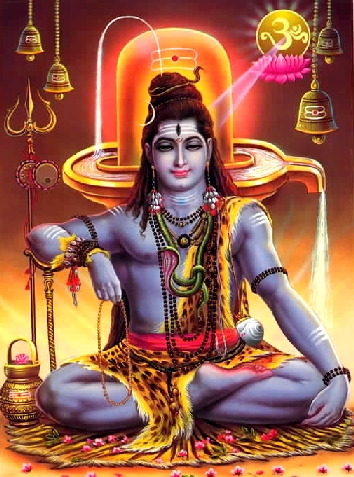 |
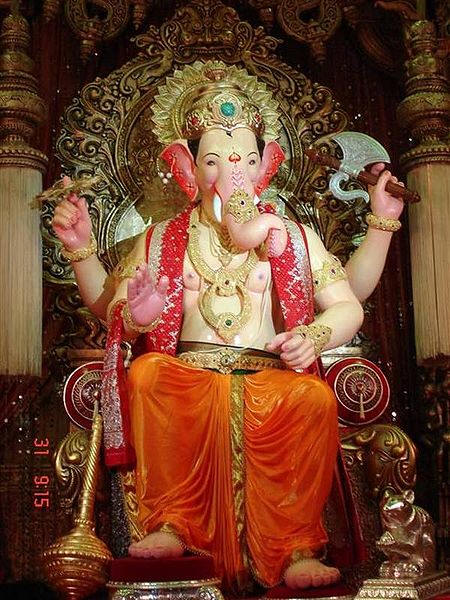 |
|
Brahma |
Vishnu |
Shiva |
Ganesha |
Origins of the Universe and Life:
Hindus hold diverse beliefs about the origins of life and the universe.
Many believe the universe is recreated in karmic cycles. Many believe in
Brahma as a Creator God.
After Death:
The laws of karma govern the rebirth of one's soul in Hinduism.
Ultimately, one's soul becomes enlightened and liberated from the cycle of death
and rebirth, entering ultimate bliss and becoming one with Brahman. During one's
cycle of death and rebirth, one's karma dictates which of the many heavens, hells,
and lower life forms one may become.
Is there Evil in the World, and Why?
Hindus generally believe that individuals can do evil if they forget their
divine natures. Some also believe in gods can do some evil. In
general, Hindus think that evil, sin, and death are illusions since all that
exists is nature, the Ultimate Reality (or God).
Central Doctrines:
Hindu religious practices consist of living in the right way, which is called
"dharma". In general, right living includes worshiping God or gods, doing good works,
going on pilgrimages to the holy places, and learning through meditation, yoga, and, with the help of a
master.
Some Hindu Links